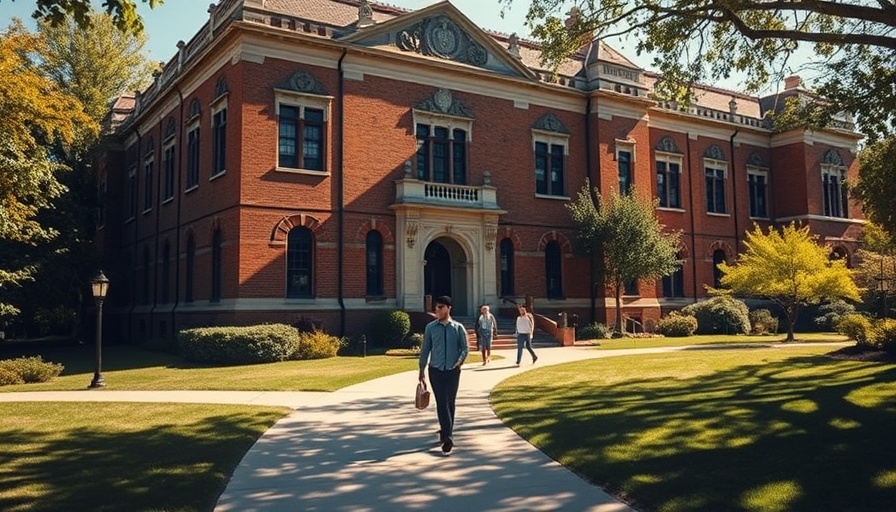
The Impact of Trump’s Decision on UCLA Research Funding and Beyond
The Trump administration's recent freeze on nearly $200 million in federal funding for UCLA has sent shockwaves through the scientific and medical community. This decision comes as the university faces accusations of antisemitism and discrimination from Jewish and Israeli students, particularly following a pro-Palestinian encampment last year.
Lawmakers and university officials are expressing deep concern over how this freeze could adversely affect critical research and innovation. UCLA Chancellor Julio Frenk voiced that the cancellation is not merely a financial blow, but a detrimental loss for all Americans who rely on life-saving medical research. The money in question was intended for various fields, including public health and science, which are crucial in advancing medical discoveries and improving quality of life.
The Underlying Issues of Antisemitism in Academia
The suspension of grant funding raises important issues surrounding accusations of antisemitism on university campuses, particularly against the backdrop of the ongoing conflict in the Middle East. Reports indicate that tensions have been exacerbated at universities like UCLA, sparking protests and further complicating students' experiences. The U.S. Department of Justice (DOJ) asserts that UCLA failed to appropriately address complaints regarding antisemitic incidents, thereby contributing to an unsupportive environment for Jewish students. This freeze on funding is positioned as a corrective measure, raising questions about the balance between free speech and ensuring a safe educational space for all.
How This Move Compares to Previous Funding Actions
This isn't the first time federal money has been tied to university conduct. Over the past few years, the Trump administration's focus has primarily targeted elite East Coast institutions like Columbia and Brown, leading to negotiations around student treatment and campus culture. However, the action against UCLA marks a significant shift—indicating a willingness to extend these measures to the West Coast and highlighting a broader agenda aimed at ensuring compliance with federal standards regarding campus conduct and student rights.
The Echoes of Political Decisions in Local Contexts
This funding freeze transcends academic walls, touching lives and industries well beyond UCLA. For residents in Bakersfield and surrounding areas, the disruption of such significant funding could hinder advancements in local healthcare, scientific research, and educational initiatives. As industries increasingly rely on cutting-edge research and development from universities, local economies and healthcare facilities may face a detrimental ripple effect.
Looking to the Future: Implications for Students and Researchers
The immediate implications of this decision can be daunting for researchers and students alike. With numerous research projects at stake, students relying on federal grants for their academic work may find themselves facing an uncertain future. The NIH and NSF funds are critical for projects that not only advance scientific knowledge but also lead to tangible benefits in public health and welfare. As the situation unfolds, these groups must also reckon with whether to adapt their research goals or pursue alternate funding sources, which may prove challenging.
Community Connections: The Importance of Advocacy
As supporters of education and scientific advancement, the Bakersfield community has a role to play in advocating for academic freedom and financial support for educational institutions. Building awareness in the community about the implications of funding freezes can foster discussions on how to support universities and defend the rights of students. Those directly affected must come together to illustrate the importance of research funding and confront the challenges presented by political maneuvering.
Actionable Steps: How You Can Get Involved
Residents interested in taking action can reach out to local representatives, encouraging them to advocate for funding that supports both academic environments and student rights. Engaging in community discussions can amplify voices advocating for balanced approaches to campus conduct. Additionally, individuals can consider supporting initiatives that promote inclusivity and understanding on college campuses. Collaboration among diverse groups can pave the way for a more enriching educational experience for all students.
As this story develops, it will be important for community members in Bakersfield to stay informed and involved in dialogues regarding higher education and its role in shaping a well-rounded society. Embracing a proactive stance on these issues will not only support UCLA but also foster a stronger educational framework throughout our region.
 Add Row
Add Row  Add
Add 



Write A Comment